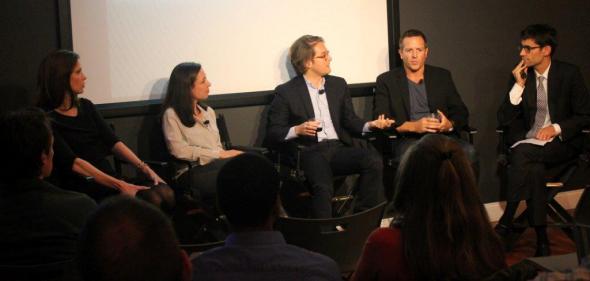Will Amazon Lead Us to the Golden Age of Books? A Future Tense Event Recap.

Photo by Tyler Bugg/New America NYC
The unfortunate Fire Phone aside, the glut of opinion pieces and blog posts about Amazon of late have really been about one thing: books.
So, is Amazon really as bad for book culture as we fear, or could the company of “1-click” sales, Kindles, and two-day shipping in fact be leading us to a golden age? A Future Tense conversation that included voices from bookselling and publishing, authors and readers, moderated by Nicholas Thompson, the editor of the NewYorker.com, tackled this question in New York on Wednesday evening. (Future Tense is a partnership of Slate, New America, and Arizona State University.)
For some of the panelists, Amazon’s challenge to the publishing industry is nothing new. “Publishers have always hated their biggest accounts,” Hugh Howey, author of the best-selling Wool series, said. When his book first came out with Simon & Schuster, he remembered, it wasn’t carried by Barnes & Noble because of an ongoing disagreement with the retailer. “My sense is that Amazon might be crushing the former predator,” he added. Sarah McNally, owner of New York’s McNally Jackson Books, recounted that when she opened her store 10 years ago, Amazon was beginning to be a force, but independent bookstores were already on their knees because of aggressive competition from chain retailers.
There is nevertheless something different about Amazon, Lucas Wittmann, executive editor of Regan Arts and the former literary editor of the Daily Beast, argued. Amazon is pushing publishers not only on pricing, but also on the key thing that they do—create content. While Amazon’s marquee publishing ventures have mostly failed, it’s making serious advances with self-publishing and genre fiction like romance and crime. “Publishers are always deluded in many, many ways,” Wittmann said. “Whether it’s how many copies of a book they’ll sell or how to market it or how great it is.” But if Amazon is going to challenge them on the creation of content and on pricing, then perhaps their fears are not entirely misplaced.
Thompson hazarded that perhaps people wouldn’t hate Amazon quite so much if they thought Amazon really cared for or understood books. As Wittman said, “at the end of the day for Amazon, a book is a diaper, is toilet paper, cars, refrigerators.” The widget argument is particularly controversial when it comes to the low pricing Amazon demands. McNally told the audience how David Shanks, the former head of Penguin, said once that the most painful thing about the e-book pricing fight is that he just didn’t think romance novels should be the same price as a history book that the author researched for 10 years.
But then many of the publishers are also part of giant corporations with responsibilities to shareholders. “We don’t talk about how Harper Collins is owned by News Corp. How Simon & Schuster is owned by CBS,” Howey stated.
All the panelists agreed that the book industry needs to change, and perhaps has already begun to. As a publisher, Wittmann said that he now sees plenty of book proposals from agents who picked up titles that had first got popular on Goodreads and other group reading sites. This new era might also prompt publishers to get smaller and a bit more focused, he said, like independents that are able to be more creative. And bookstores like McNally Jackson have some advantage because they’re still far superior to Amazon when it comes to discoverability, mostly because Amazon’s algorithms still fail at search. “My philosophy since I opened the store is that book sales are never finite,” McNally said. “[The industry] will sell as many books as it inspires people to buy.”
So could the perfect publishing industry in fact be right now? After all, as Thompson noted, we have vibrant publishers, self-publishers, Amazon, and great bookstores. Howey agreed emphatically, concluding that “there’s never been a better time in history to be a reader or a writer.” But perhaps the golden age is always the one that came just before our own. As Manoush Zomorodi, host of WNYC’s New Tech City, asked: Wasn’t the true golden age of books the heyday of Oprah’s Book Club?
Listen to the event using the player below:
Future Tense is a partnership of Slate, New America, and Arizona State University.
